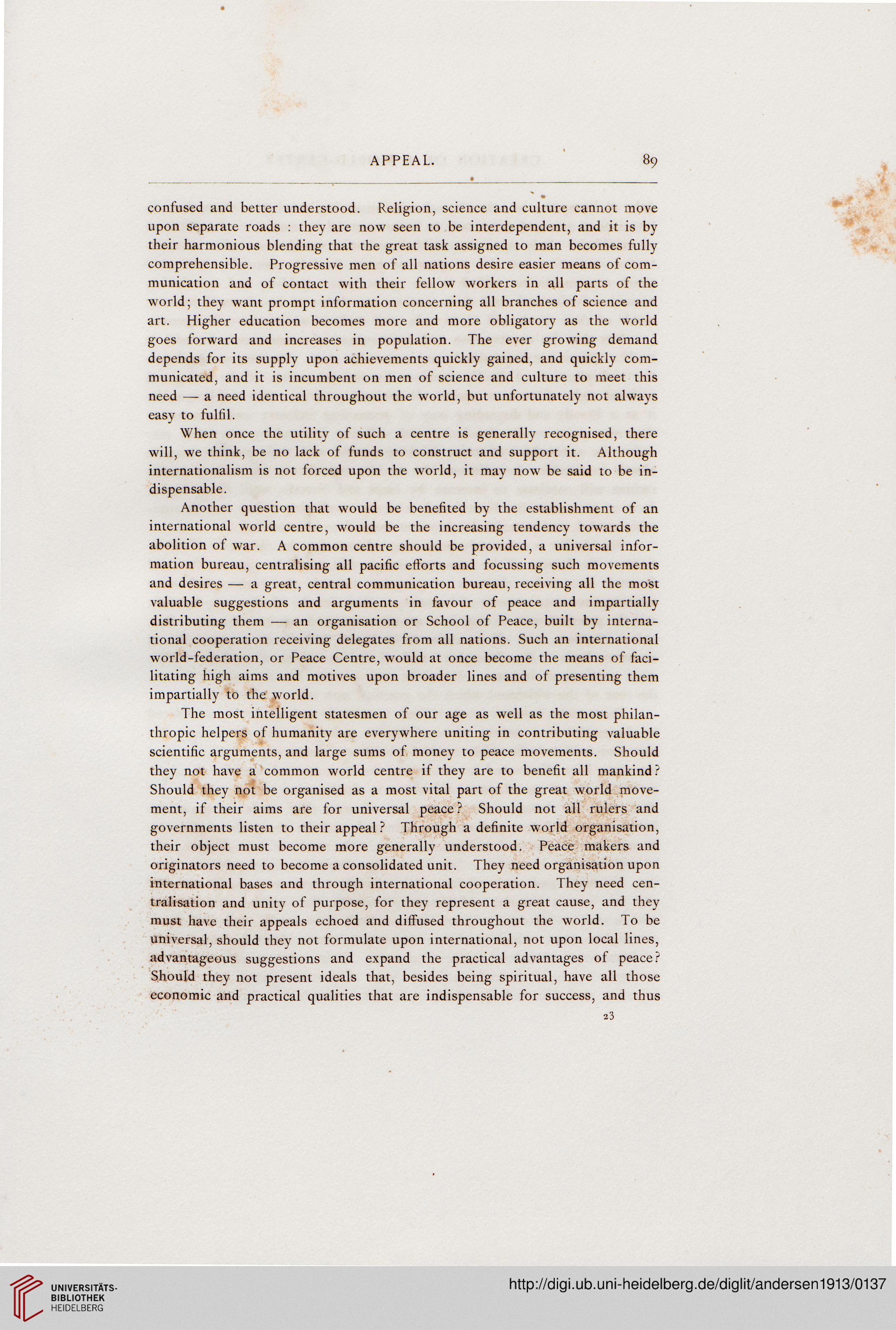APPEAL.
89
confused and better understood. Religion, science and culture cannot move
upon separate roads : they are now seen to be interdependent, and it is by
their harmonious blending that the great task assigned to man becomes fully
comprehensible. Progressive men of all nations desire easier means of com-
munication and of contact with their fellow workers in all parts of the
world; they want prompt information concerning all branches of science and
art. Higher education becomes more and more obligatory as the world
goes forward and increases in population. The ever growing demand
depends for its supply upon achievements quickly gained, and quickly com-
municated, and it is incumbent on men of science and culture to meet this
need — a need identical throughout the world, but unfortunately not always
easy to fulfil.
When once the utility of such a centre is generally recognised, there
will, we think, be no lack of funds to construct and support it. Although
internationalism is not forced upon the world, it may now be said to be in-
dispensable.
Another question that would be benefited by the establishment of an
international world centre, would be the increasing tendency towards the
abolition of war. A common centre should be provided, a universal infor-
mation bureau, centralising all pacific efforts and focussing such movements
and desires — a great, central communication bureau, receiving all the most
valuable suggestions and arguments in favour of peace and impartially
distributing them — an organisation or School of Peace, built by interna-
tional cooperation receiving delegates from all nations. Such an international
world-federation, or Peace Centre, would at once become the means of faci-
litating high aims and motives upon broader lines and of presenting them
impartially to the world.
The most intelligent statesmen of our age as well as the most philan-
thropic helpers of humanity are everywhere uniting in contributing valuable
scientific arguments, and large sums of money to peace movements. Should
they not have a common world centre if they are to benefit all mankind ?
Should they not be organised as a most vital part of the great world move-
ment, if their aims are for universal peace ? Should not all rulers and
governments listen to their appeal? Through a definite world organisation,
their object must become more generally understood. Peace makers and
originators need to become a consolidated unit. They need organisation upon
international bases and through international cooperation. They need cen-
tralisation and unity of purpose, for they represent a great cause, and they
must have their appeals echoed and diffused throughout the world. To be
universal, should they not formulate upon international, not upon local lines,
advantageous suggestions and expand the practical advantages of peace?
Should they not present ideals that, besides being spiritual, have all those
economic and practical qualities that are indispensable for success, and thus
23
89
confused and better understood. Religion, science and culture cannot move
upon separate roads : they are now seen to be interdependent, and it is by
their harmonious blending that the great task assigned to man becomes fully
comprehensible. Progressive men of all nations desire easier means of com-
munication and of contact with their fellow workers in all parts of the
world; they want prompt information concerning all branches of science and
art. Higher education becomes more and more obligatory as the world
goes forward and increases in population. The ever growing demand
depends for its supply upon achievements quickly gained, and quickly com-
municated, and it is incumbent on men of science and culture to meet this
need — a need identical throughout the world, but unfortunately not always
easy to fulfil.
When once the utility of such a centre is generally recognised, there
will, we think, be no lack of funds to construct and support it. Although
internationalism is not forced upon the world, it may now be said to be in-
dispensable.
Another question that would be benefited by the establishment of an
international world centre, would be the increasing tendency towards the
abolition of war. A common centre should be provided, a universal infor-
mation bureau, centralising all pacific efforts and focussing such movements
and desires — a great, central communication bureau, receiving all the most
valuable suggestions and arguments in favour of peace and impartially
distributing them — an organisation or School of Peace, built by interna-
tional cooperation receiving delegates from all nations. Such an international
world-federation, or Peace Centre, would at once become the means of faci-
litating high aims and motives upon broader lines and of presenting them
impartially to the world.
The most intelligent statesmen of our age as well as the most philan-
thropic helpers of humanity are everywhere uniting in contributing valuable
scientific arguments, and large sums of money to peace movements. Should
they not have a common world centre if they are to benefit all mankind ?
Should they not be organised as a most vital part of the great world move-
ment, if their aims are for universal peace ? Should not all rulers and
governments listen to their appeal? Through a definite world organisation,
their object must become more generally understood. Peace makers and
originators need to become a consolidated unit. They need organisation upon
international bases and through international cooperation. They need cen-
tralisation and unity of purpose, for they represent a great cause, and they
must have their appeals echoed and diffused throughout the world. To be
universal, should they not formulate upon international, not upon local lines,
advantageous suggestions and expand the practical advantages of peace?
Should they not present ideals that, besides being spiritual, have all those
economic and practical qualities that are indispensable for success, and thus
23





